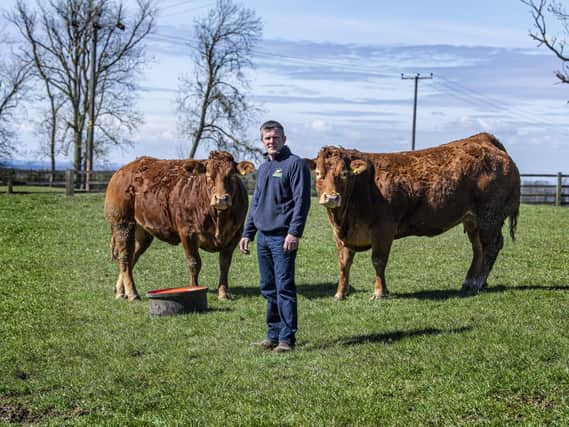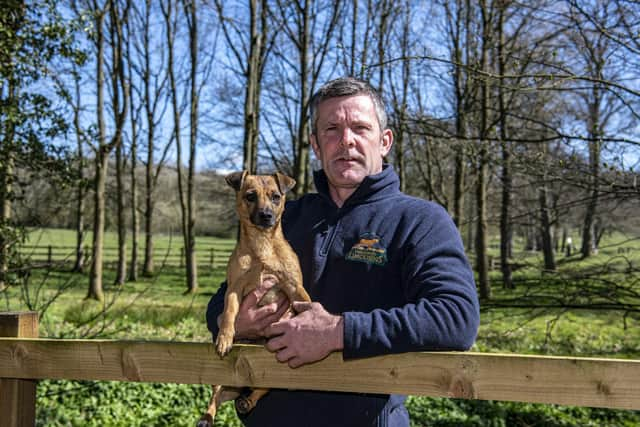Farm of the Week: Breeding prime Limousin cattle on Lord Halifax's Garrowby Estate


Last year the estate took a huge step forward when adding to their pedigree Limousin herd with the purchase of the renowned Gunnerfleet herd from breeder Ian Handley of Chapel-le-Dale.
Clive said the substantial investment had been made following a long association with Ian and that it had already begun to pay dividends with the sale of over 30 bulls direct from the farm in the past year and semen sales from the rights to bulls acquired as part of the deal.
Advertisement
Hide AdAdvertisement
Hide Ad“I had purchased Limousin bulls from Ian in the past, including Glenrock Ventura whose influence on the herd lies quite deeply with me. Our commercial herd already had much in the way of Gunnerfleet in it.


“Ian and I have often visited France together to scout for quality bulls. We’ve always liked the same type of cattle. When he made the decision to sell his herd he approached me saying he’d liked it to have been kept together.”
Clive understood the financial commitment that would be required and mentioned the prospect to the estate's owner Lord Halifax who, along with his son James Irwin, share Clive’s passion for the cattle, and negotiations began.
“I knew the value of the animals and what Ian had achieved with them over the years. We had been trying to get our commercial herd up to 200 cows. We had invested in a new building and had been adding more of our own heifers, but it was taking a long time. Acquiring Ian’s herd was an opportunity to take our pedigree and commercial herds to our target figure in one go.”
Advertisement
Hide AdAdvertisement
Hide AdFurther purchases of the German breed of Fleckvieh cows as recipient females for Limousin embryo work has brought the calf-carrying number of cows to where Clive wanted it to be as he now has around 80 pedigree cows, 25 Fleckvieds and around 100 commercials.
“We bought the whole Gunnerfleet herd, which included 50 cows, 16 young bulls, 13 maiden heifers, some embryo recipients in-calf, stock bulls and rights to bull semen sales.
“The herd included the excellent stock bull Ampertaine Magnum for 70,000 guineas. The semen rights were for Magnum and Plumtree Fantastic, which is very influential in the Limousin stud. The Fleckvied cows were purchased separately elsewhere. They are very quiet animals and are great mothers, giving birth to excellent Limousin calves.”
Clive said that selling stock to other breeders now makes up nearly all of his cattle sales.
Advertisement
Hide AdAdvertisement
Hide Ad“Our aim is to produce good working bulls for the commercial breeder. We’d hope the very top-end pedigree Limousin bulls would sell at a premium to a pedigree breeder, but our main customer is the commercial farmer looking for breeding stock that will provide those optimum cuts of meat.
“I’m not necessarily looking to produce the largest animal. I want a good thickness of loin, great shape, legs and presence. It’s all about something that makes the farmer keep coming back for more. Repeat buyers are everything.
“In our first year of trading bulls towards the level we want to be, we averaged a price that was comparable with sales at Carlisle. I think people have been happier coming to the farm to view the animals, due to Covid, rather than go to a big sale where there are people from all over the country. We would normally go to sales at Skipton and Carlisle. We’re due at Carlisle next month.”
Clive said commercial bulls and pedigree Limousin heifer sales are also on the increase as Garrowby’s reputation grows.
Advertisement
Hide AdAdvertisement
Hide Ad“We’re now getting commercial buyers who want a British Blue-cross-Limousin bull because of the market they are aiming for and that provides us with another target market. We have a British Blue bull.
“Our Limousin breeding heifers are in demand because of our high health status. We don’t push them unless there’s a sale coming up. We are BVD accredited and Johnes level 1 across both herds.”
Calving is split into two 10-week periods in spring and autumn - March to May and September to November. Clive said he sees it going more towards autumn calving because of the greater demand at the February and May bull sales, when bulls are coming into their first working year.
All the spring-born calves go out to grass with their mothers and receive a creep feed growing ration. Clive said the commercial calves are first to leave the farm.
Advertisement
Hide AdAdvertisement
Hide Ad“The commercial calves are weaned and sold straight off their mothers. We want the bull and heifer calves to grow to their optimum and they get most of that through milk from their mothers and grazing.
“Our commercial herd is there as a shop window, to show what our home-produced bulls can do. We’ve also developed a business of producing show calves, specifically Limousin-cross-British Blue black calves where we earn a premium selling at the Leyburn Spring Spectacular.”
When Clive first took up his position at Garrowby just over 21 years ago the herd was made up largely of Aberdeen Angus-cross cattle. Clive said it wasn’t working and he put his faith in the Limousin.
“It’s a breed for me that ticks so many boxes. It produces a fertile suckler cow with longevity, plenty of milk that also produces an animal that’s ready for slaughter at the optimum time and weight.”
Advertisement
Hide AdAdvertisement
Hide AdClive has responsibility for the estate’s 750 acres of in-hand land that includes around 130 acres of arable cropping and 700 breeding ewes.
“I spend most of my time with our pedigree and commercial herds, and although it is lambing time I don’t do as much as I used to. The sheep are Mules and Texel-cross-Mules and we have 350 of each on the Wolds land. We sell two-thirds of the lambs off grass during summer into autumn with the other third going as breeding gimmers or stores.”